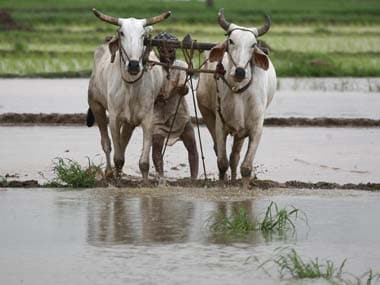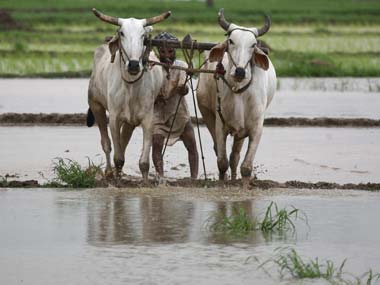India’s public sector banks (PSBs) are perfect examples of conflict of interest that happens when publicly listed, commercially run lending institutions are micromanaged by their majority shareholder - the government. This happens when the government gets too involved in the business of running business.[caption id=“attachment_2330352” align=“alignleft” width=“380”]  Loan equation. Reuters[/caption] On the one hand, the finance ministry is pushing PSBs for efficiency in operations and even link capital infusion into these banks to their business efficiency parameters, but turns a blind eye to frequent political intervention in the commercial decisions of banks, which, in turn, make them weaker. The latest twist in this unfair game is unfolding in Maharashtra, where the state administration has clamped down on about 24 branch mangers of various nationalised and cooperative banks for not meeting farm lending targets to farmers. The Times of India quotes Amaravati collector, Kiran Gitte, as saying that the government has invoked Section 188 of IPC, which pertains to disobedience to order promulgated by a public servant, for disobeying government orders on farm credit. According to the report, banks disbursed Rs 1,036 crore loans in Amaravati as against the target of Rs 1,695 crore. Across 17 districts, banks have disbursed Rs 14,000 crore as against Rs 24,000 crore targeted by 30 June. Earlier, Maharashtra Chief Minster Devendra Fadnavis had issued a warning to state-run banks on 15 June for going slow on lending to farmers and subsequently issued instructions to district collectors to clamp down on those ‘at fault’. The 24 banks against which action has been taken by the state authorities include 10 nationalised banks and 14 cooperative banks. Before getting into the merits or demerits of the Maharashtra government’s move, let’s look at the current scenario of bank funding to agriculture. It is evident from the national as well as state-wise distribution of farm credit. But, there has been no deficiency of bank money to the sector. Until now, Indian banks have lent about Rs 800,000 crore of loans to Indian farmers in the category of agriculture and allied activities. Banks are given annual farm credit targets by the government in the Union Budget. Also, the rules set by the Reserve Bank of India in the priority sector guidelines mandate that banks should lend 18 percent of the total loans to agriculture and allied activities. In the 2015 Union Budget, this target stood at Rs 850,000 crore, which, if fulfilled will constitute some 14 percent of the total bank loans given. This segment of loans has only grown over years and has never shown any decline, making agriculture one of the biggest exposures of banks. Certainly, the distressed farmer needs credit but funding isn’t the single-most factor that is plaguing the farm sector. The problem lies somewhere else. Incidentally, this is also among the high stress areas for banks. Hence, it is quite natural that banks exercise caution on further lending to a sector, which is already a pain on their books. The government heavily subsidises farm credit. Farmers get the loan at an interest rate of 7 percent (government subsidise 2 percent). The interest rate further falls to 4 percent on proper repayment. In reality, most of these loans do not reach the farmer in actual distress but often get misdirected to non-agriculture consumption use. A major part of the farm credit is disbursed through Kisan Credit Cards. This acts like a normal credit card, permitting the farmer to withdraw credit depending upon the need at a given point of time. By virtue of the design of this product, the credit limit for borrower goes up every passing year and very little repayment happens on loans drawn. According to bankers, there is evidence that a significant chunk of this money is used for consumption-related use, and not crop production or the farm credit doesn’t reach the intended beneficiaries. This, perhaps, partly explains the fall in agriculture output. Agriculture as a percentage of GDP has fallen from over 51 percent (when?) to just about 16 percent now. Had funding been the only decisive factor, this sort of drop in production wouldn’t have happened. Even for the rural economy, agriculture has long lost its position as the biggest income generator. According to studies, more than two thirds of the rural income now comes from non-agri sources . The illusion of autonomy One can’t really blame Fadnavis or, for that matter, any state government, for meddling with the business decisions of banks, for the simple reason that the central government’s policies have been not very different on this subject. Even though government banks have been promised autonomy in their operations, this has never been the practice. Successive governments, whether UPA or NDA, have been micromanaging state-run banks by influencing their business decisions, directing lending to specific sectors and forcing targets of politically sponsored schemes on these entities. Agriculture being a politically sensitive sector, the political interest has always outweighed the commercial priorities of banking institutions. “This is a wrong practice,” said a senior banking industry official, who didn’t want to be named. “The bank managements should come out against such a move (by politicians).” The problem is even more severe with co-operative banks, where boards are dominated by political outfits and business decisions are influenced in a big way. One of the major reasons why state-run banks have plunged into a difficult position (over 90 percent of the Rs 300,000 crore bad loans of Indian banks is on the books of state-run banks), is their lack of autonomy. Result: Banks are forced to use a big chunk of the capital they (are yet to) get to clean up their books, rather than business expansion. If the NDA government wants to improve the profitability of state-run banks, it should first offer the autonomy, to operate freely and stop meddling with their commercial decisions. During the UPA days, the micromanagement of state-run banks and imposition of unrealistic lending targets on these banks have greatly contributed to the current mess faced by PSBs, pushing some of them to the brink of survival. The Modi government, in its first year in office, has largely followed this policy by using state-run banks as channels to execute government schemes keeping bankers at gun-point. Hence, it isn’t surprising state governments take cues and follow the same path. The short message is that the problem with farming sector lies much deeper beyond funding. It is high time the governments stop treating state-run banking entities as milch cows.
According to the report, banks disbursed Rs 1,036 crore loans in Amaravati as against the target of Rs 1,695 crore.
Advertisement
End of Article


)

)
)
)
)
)
)
)
)



